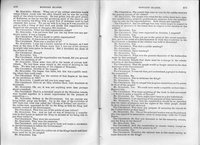600-601
| Previous Page | Next Page |

|
Mr. Spalding. Gibson. When one of his cabinet associates would resign Gibson would take the office himself, and he was the moving spirit of the whole Government. He had gotten into the good graces of Kalakaua, so that he was the governing spirit of the country, and he was treating the King with a good deal of deference until he had obtained this power. We put up with it so long as it was possible to put up with a thing of that kind, and finally this organization was formed for the purpose of changing this business.
The Chairman. What was that organization called?
Mr. Spalding. I do not know that you can say there was any particular name; it was a League.
The Chairman. Was it a secret or public organization?
Mr Spalding. It was a secret organization.
The Chairman. Were you a member of it?
Mr. Spalding. I was not a known member of it, because, as I told them at the time, if Mr. Gibson knew that I was one of the advisors he might take some pains to thwart it. But I furnished my share of the sinews of war.
The Chairman. Money?
Mr. Spalding. Yes.
The Chairman. After the organization was formed, did you proceed to arm the members of it?
Mr. Spalding. These arms were all in the hands of private individuals. We had these arms simply in the event of desiring to use them. We then had a meeting of the citizens of Honolulu.
The Chairman. Outside of the league?
Mr. Spalding. The league was there, but this was a public meeting where they could come.
The Chairman. What was the number of that league at the time of the revolution of 1887?
Mr. Spalding. I could not tell you how many men.
The Chairman. Give us an idea, whether there were hundreds or thousands.
Mr. Spalding. Oh, no; it was not anything more than perhaps about a hundred.
The Chairman. That is, a hundred people of the Hawaiian islands were banded together in a secret organization for the purpose of compelling----
Mr. Spalding. Reform in the Government. Let me express one thing before going any further. Up to the time of the revolution of 1887 there was what was called the "House of Nobles," not elective— the nobles were appointed for life by the King, so that the King had actually control of the Government.
The Chairman. That was one of the points of your reform?
Mr. Spalding. Yes. And we had no way of obtaining a majority vote in that house as against the King on account of his being able to put these nobles in.
The Chairman. They were his creatures?
Mr. Spalding. They were his creatures.
The Chairman. And you had to go to work and create a revolution in the Government to reform the Government?
Mr. Spalding. Yes.
The Chairman. To take the nobles out of the King's hands and have them voted for by the people?
Mr. Spalding. Yes.
|
The Chairman. The people who were to vote for the nobles were not the general masses of the voters?
Mr. Spalding. The people who voted for the nobles must have separate qualifications, property qualifications, separate from the qualifications to vote for the representatives. Both houses sat together.
The Chairman. But the suffrage was very much larger in respect to election of members of the house than in respect to the election of the nobles?
Mr. Spalding. Yes.
The Chairman. They were organized by districts, I suppose?
Mr. Spalding. Yes.
The Chairman. When you got to the point of this secret organization, got to the point of a determination to work this revolution in the Government, a meeting of the citizens was held in Honolulu?
Mr. Spalding. Yes.
The Chairman. Was that a public meeting?
Mr. Spalding. Yes.
The Chairman. Open meeting?
Mr. Spalding. Yes.
The Chairman. What was the general character of the declaration made by that meeting?
Mr. Spalding. Simply that there must be a change in the administration of the Government.
The Chairman. That the people would no longer submit to the then workings of the Government?
Mr. Spalding. Yes.
The Chairman. It was not then, as I understand, a project to destroy the monarchy?
Mr. Spalding. No.
The Chairman. Nor to dethrone the King?
Mr. Spalding. No.
The Chairman. But to compel him to grant restrictions on his power in favor of the people?
Mr. Spalding. Yes. We could have made a republic at that time— deposed him.
The Chairman. Was there anything of the kind in that movement —a desire to make a republic of Hawaii?
Mr. Spalding. No. There might have been in a few individuals.
The Chairman. I am speaking of the purpose of that movement.
Mr. Spalding. It was that the constitution should be so amended that the rights of property and the rights of the white people should be more respected and observed.
The Chairman. Was there any purpose of annexing the islands to the United States at that time?
Mr. Spalding. No. One of the principal leaders was an Englishman who was opposed to annexation—even to reciprocity—with the United States.
The Chairman. So that you intended to let the monarchy remain, and the King on his throne?
Mr. Spalding. Yes.
The Chairman. And the constitution to remain intact, except as you had amended it, with the grants in it?
Mr. Spalding. Yes.
The Chairman. Therefore the citizens met in this secret society to make demands on the King?
| Previous Page | Next Page |